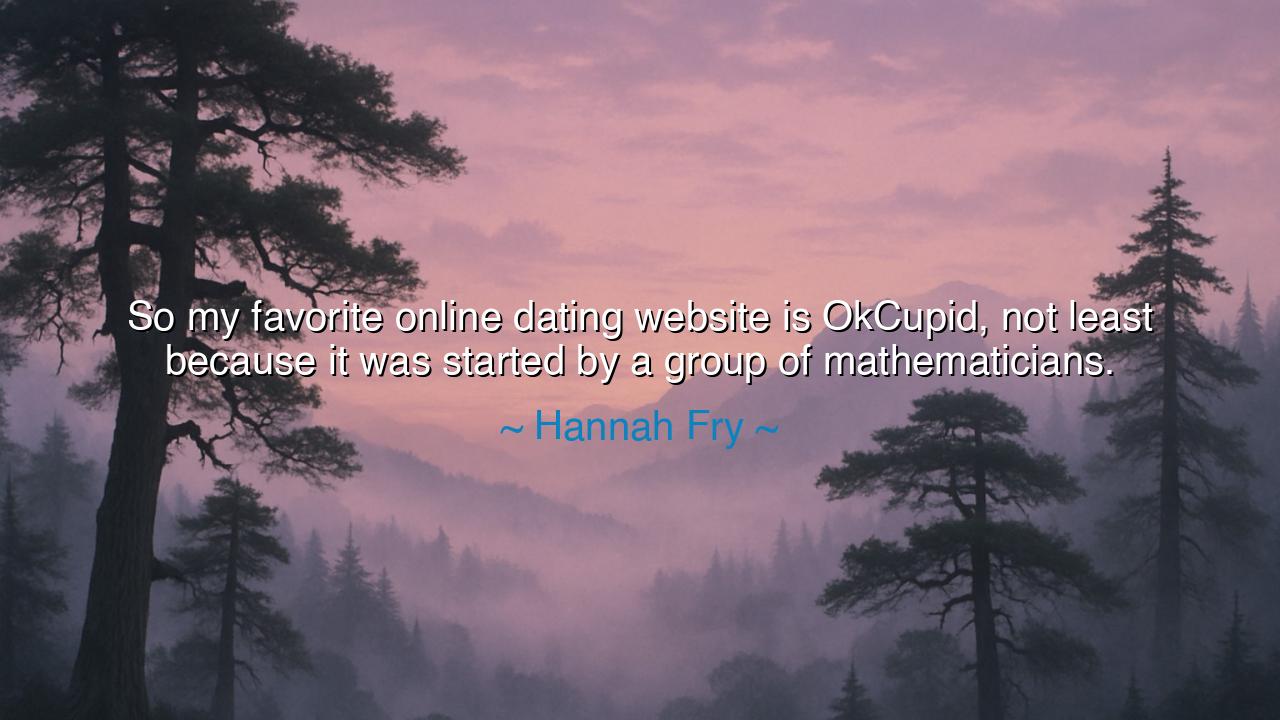
So my favorite online dating website is OkCupid, not least
So my favorite online dating website is OkCupid, not least because it was started by a group of mathematicians.






In the words of Hannah Fry, “So my favorite online dating website is OkCupid, not least because it was started by a group of mathematicians.” we hear the elegant humor of a mind that finds beauty in both logic and love. Beneath the lightness of tone lies a profound reflection on the human attempt to measure the immeasurable — to bring order to the chaos of the heart, to find patterns in passion, and reason in romance. For what is love, if not the grandest mystery that even the greatest minds struggle to quantify? Fry’s admiration for such a creation reveals her belief that intellect and emotion need not be rivals, but companions in our eternal search for connection.
The meaning of her words unfolds on two planes — the literal and the symbolic. Literally, she speaks of OkCupid, a platform built by mathematicians who sought to apply algorithms and probability to the art of matchmaking. But symbolically, she celebrates the idea that even within the boundless field of feeling, there lies room for structure, for the quiet guidance of reason. It is as though she reminds us that love, while wild and unpredictable, also obeys hidden patterns — like the stars that seem scattered, yet trace a secret geometry across the heavens. The mathematician’s love is not colder; it is more curious, more reverent of the complexity it beholds.
The origin of this quote can be traced to Fry’s lifelong fascination with how mathematics mirrors the human condition. As a mathematician herself, she has sought to show that numbers are not lifeless, but alive with story and emotion. The creators of OkCupid shared this belief — that formulas could illuminate the pathways of human attraction, even if they could never fully contain them. They built their platform not to dictate love, but to better understand it. In that spirit, Fry’s statement becomes almost philosophical: she honors those who dare to use logic not to restrain the heart, but to reveal its secret symmetries.
The ancients, too, saw this kinship between mathematics and love. Pythagoras, who heard music in the movement of the stars, believed that the universe itself was composed of harmony — that all creation, from the turning of planets to the beating of hearts, followed divine proportion. To him, numbers were not mere symbols, but the language of existence. In that same spirit, the mathematicians of OkCupid, guided by equations and data, reached toward the ineffable — to find in the cold clarity of math some reflection of the warmth of human longing. Like the philosophers of old, they sought to unveil the hidden order behind the seeming randomness of desire.
Yet, Fry’s words also contain a gentle irony — for even with all the data in the world, love refuses to be solved. The algorithm may predict attraction, but it cannot measure tenderness, nor quantify devotion. No equation can foresee the trembling joy of two souls who meet by chance, nor the unspoken understanding that binds them. And yet, it is precisely this paradox that Fry delights in: that reason and romance dance together, each illuminating what the other cannot. The mathematician can trace the probabilities of meeting, but love itself will always remain gloriously unpredictable — a mystery that humbles the intellect and exalts the heart.
In her lighthearted remark, Fry reveals a deeper wisdom — that the pursuit of knowledge is not opposed to the pursuit of love, but part of it. Both are acts of faith: faith that there is meaning behind the unknown, that the universe, though vast, is connected. Whether through numbers or emotions, we are all seekers tracing patterns in the dark, hoping they lead us to someone who understands. In this sense, to honor mathematics is to honor love itself — for both require patience, imagination, and courage.
So, my children, let this be your lesson: seek truth in both the heart and the mind. Do not be afraid to blend the rational with the romantic, for wisdom lies in their union. Approach love not as chaos to be conquered, but as a mystery to be explored. Learn to see patterns in people, not to control them, but to understand them. For just as a mathematician finds beauty in symmetry, so too can we find meaning in the shared design of our connections.
And remember, as Hannah Fry reminds us with a smile, even the mathematicians who built OkCupid — those who charted the probabilities of affection — knew that numbers could only take them so far. Beyond the equations lies the realm of the human heart, where logic bows to wonder, and where every soul, in its own time, discovers the most profound truth of all: that love cannot be calculated, only lived.






AAdministratorAdministrator
Welcome, honored guests. Please leave a comment, we will respond soon